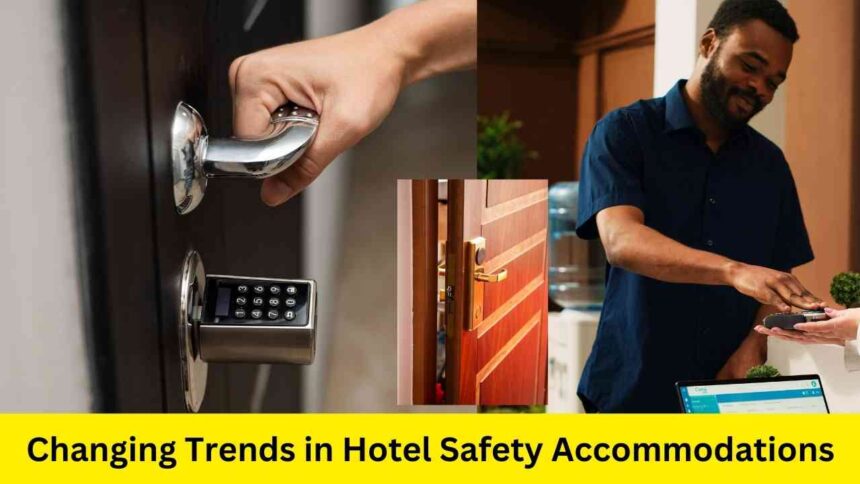The hospitality industry is ever-changing, dynamically adapting to travelers’ shifting needs and preferences. One key aspect that has remained steadfast through the years is the commitment to guest safety. What has changed is how establishments maintain this necessity without intruding on comfort.
Technology has been at the forefront of shaping hospitality security trends in recent years. Here are some current developments in hotel safety accommodations.
1. IoT-Integrated Security Systems
The Internet of Things is revolutionizing hotel safety processes and facilitating more centralized and efficient security management by connecting various devices and systems. IoT ecosystems feature interconnected systems, including smart locks, motion sensors, high-definition cameras, smoke detectors, and more — all working together to provide a comprehensive security network.
This approach enhances real-time monitoring and provides more proactive security measures for guests and staff. Concord Hospitality employs IoT solutions that allow hotel employees to call for immediate assistance if they feel unsafe or become injured on duty.
2. AI-Enabled Threat Detection and Response
The use of AI in hotel safety systems has become increasingly prevalent. Advanced algorithms can analyze large datasets from interconnected surveillance systems to detect suspicious behavior or potential threats. AI-enabled security frameworks can also automate certain responses, such as locking down areas or alerting hotel staff. These measures can significantly improve emergency reaction times and ensure a safer hotel stay.
AI has become a fundamental aspect of cybersecurity, which has become increasingly paramount in today’s digital age. Hotel Wi-Fi networks are only as secure as management builds them.
AI predictive analytics can ensure a more robust network to safeguard the personal information of guests using the internet. The proliferation of AI systems is also expected to propel the industry forward by powering travel-related apps and streamlining processes. These integrations can expand the travel and tourism sector by up to 38% CAGR in 2024.
3. Cleaner Spaces
A hotel’s commitment to safety includes providing clean and hygienic spaces and accessories throughout your stay. You’d expect this from every hotel, but that’s not always the case. A recent study found that the stairwell door handle in the average hotel has 918 times more germs than a toilet seat.
This raises concerns about hygiene issues, especially if you do a lot of walking in and around the premises. These spaces are often thoroughly wiped down multiple times daily. However, the sheer volume of people entering and exiting the establishment increases the likelihood of contamination. Nevertheless, let this be a reminder to refrain from touching surfaces in a hotel.
4. Keyless Entry
Keyless entry systems are a major leap in hotel security. Adopting the use of smartphones essentially eliminates the usual vulnerabilities associated with plastic keycards and physical keys. These items can easily be lost or stolen, significantly increasing the risk of unauthorized access. Keyless technology provides robust encryption on top of your phone’s biometric security features. In case of theft or misplacement, the hotel can deactivate the phone entry feature and issue a different way to access your room.
Keyless entry is becoming a standard as the hospitality industry innovates. This shift is echoed by the sector’s movement toward digital technologies for everyday operations. These systems enhance efficiency and ensure guests benefit from convenient and secure room access.
5. Enhanced Fire Safety Standards and Measures
Cooking equipment, heating appliances, smoking guests, and faulty electrical systems are just some of the leading fire hazards in hotels. As the risk of fire-related incidents in the hospitality sector evolves, so must the security measures in place to address them.
The National Fire Protection Association (NFPA) is an excellent resource for keeping up to date on fire safety standards. Hotels can tap into this wealth of information to save lives and minimize loss in fire and electrical hazards. The NFPA updates its safety codes every three to five years, ensuring members can access the latest updates on best approaching specific scenarios.
6. Autonomous Hotel Shuttle Services
Hotels can extend the safety factor to guests by providing autonomous shuttle services from the airport. Self-driving vehicles may be safer than human drivers since there’s no risk of distracted driving and no emotional element, a key culprit in road crashes. These automobiles can also reduce travel time and adapt to various passenger needs, such as interior configurations for travelers with reduced mobility. These features help improve the overall guest experience.
Facilitating Safer Hotel Accommodations
When you book a hotel, you’re entrusting more than just your luggage to the establishment, but also your safety. Embracing emerging developments and continuously improving security standards ensures hotels provide safer accommodation experiences and remain competitive in the future.
Jack Shaw is the senior writer for Modded, a men’s lifestyle publication. An avid outdoorsman and lover of travel, he’ll often find himself taking retreats out into nature to explore the world and encourage others to do the same.





